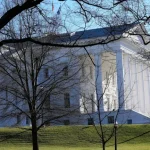

The Washington, D.C., Council will meet on Jan. 23 to discuss passing sweeping, comprehensive public safety legislation as the district’s crime rates continue to rise after staggering final numbers in 2023.
Among the most common crimes in Washington are carjackings and robberies, with everyday citizens, small businesses, and members of Congress falling victim to repeat offenders. Juvenile crime has soared in the district, as well, as critics say prosecutors are not doing enough to punish young criminals who have gone on to commit the same or more violent crimes.
The council has worked to update the public safety laws that have not been comprehensively changed since 1901.
The district’s governing body overhauled the district’s criminal code in 2022 to reduce offenses and penalties for homicide, robberies, and carjackings, the first time in 100 years that such changes had been made. However, the criminal code, like all legislation coming out of the district, is subjected to federal oversight. So, Congress voted to overturn the overhaul, marking the first time in 30 years that Congress repealed a local law passed by the D.C. Council.
District councilmembers passed a separate police reform bill in the spring of last year that improved police accountability, banned chokeholds, and increased deescalation training for law enforcement officers. In the summer, they passed an emergency public safety bill to address the rise in homicides and violent crime. Now, the new public safety bill offers more provisions for police to combat crime in the district, drawing concerns from some council members.
In 2023, motor vehicle theft increased 82%, robberies increased 67%, and homicides increased 35%. Within the first three weeks of 2024, there have been more than 240 carjackings and 112 robberies.
The package, put forward by Councilwoman Brooke Pinto, combines several bills and proposals from both the council and Mayor Muriel Bowser. Here are some of the provisions of the Secure DC Omnibus bill, with official bill text found here.
Drug-free zones
One of the most controversial measures of the omnibus package includes the revival of a 1990s-era policy called “drug-free zones.”
Under the rule, the Metropolitan Police Chief could declare a defined area a “drug-free zone” for up to five days. During that time, it would be illegal to gather there for “participating in the use, purchase, or sale of illegal drugs.” Police could order those who are believed to be engaging in those activities in a drug-free area to disperse and even arrest those who refuse to leave.
Pinto and Bowser support the return of the policy, saying it provides the police with additional tools to combat drug activity in the district. Opponents of the provision worry it will enable police harassment. During the judiciary committee’s hearing on the bill, Councilwoman Christina Henderson said she was concerned that the zones could “criminalize individuals who are suffering from substance abuse disorder.”
“Let me be clear: Yes, we need to disrupt the sale of illegal drugs and shut our open-air drug markets, but we can do that while supporting those who are suffering from addiction and ensuring they don’t end up in jail, which is not going to lead to further treatment,” she said. “I’m not yet sure that we struck that balance here, so I want to continue working with you over that.”
The omnibus drug-free zone provision is similar to the one in Bowser’s bill, the Addressing Crime Trends Now Act, but it does list exceptions. For example, police officers cannot stop people who are in the area because they are seeking drug treatment at a facility that lies within the zone.
Definitions of crimes and penalties
The bill provides several changes in definitions for crimes, including their maximum penalties.
Several penalties have been increased for gun-related offenses and crimes targeting certain groups of people, such as transit workers, adults with disabilities, and senior citizens. The penalty for crimes committed near recreational centers would be increased, as well.
Other proposals included in the omnibus bill increase maximum sentences for gun-related crimes from one to five years, expand the definition of a carjacking to make it a crime anytime the victim is not just in their car but in the vicinity of the vehicle as well, and ban mask-wearing for people committing crimes.
New offenses would be created, such as “endangerment with a firearm” and discarding a firearm or ammunition. Strangulation would be deemed a felony, and the bill would lower the threshold for retail theft, making it a felony to steal $500 worth of merchandise instead of $1,000.
Pretrial detentions and arrest procedures
Under the new crime bill, it would make it a rule that juveniles will be held in pretrial detention if they are charged with certain violent crimes. Even though a small number of people on pretrial release are there for violent crimes, Bowser and Pinto have long expressed concern even a small number of repeat offenders can cause significant damage to the district.
This is a similar provision to the emergency public safety bill that was passed in July 2023, which created a new offense for firing a gun in public and makes it easier for prosecutors to extradite people for misdemeanors. The most significant provision of the July bill is that it made it easier for judges to hold people in jail pending trial if they have a history of committing violent crimes. For juveniles, it applies to those who commit violent offenses, such as homicide, sexual abuse, carjacking, and assault.
Other provisions include allowing law enforcement to collect DNA evidence earlier in the legal process and clarifying that certain GPS records can be used in court against people under pretrial supervision.
Police reform rollbacks
One of the more controversial aspects of the bill includes rollbacks on certain policies that the D.C. Council has passed in recent years, incorporating policies included in Bowser’s ACT Now Act. The Secure DC Omnibus would allow officers to review bodycam footage as they are writing police reports, with the exception being cases where an officer is accused of using serious force or killing someone.
It also loosens the prohibition of law enforcement neck restraints. Police leadership and the DC Police Union have argued the law restricting neck restraints is too broad and leads to officers being penalized for accidentally touching someone’s neck or touching a person’s neck to protect them from self-harm. Now, the bill clarifies that incidental touching of a person’s neck is not prohibited and a neck restraint may be used to limit a person’s movement.
Councilman Charles Allen, who is facing a recall effort for his perceived lack of dedication to curb crime in Washington, expressed concerns over the police rollbacks.
CLICK HERE TO READ MORE FROM THE WASHINGTON EXAMINER
“I’ll note specifically, I am concerned about the proposed rollback on some of the transparency and accountability for police misconduct against the public, and I hope that I continue working with you on those provisions as this moves forward to a full vote on the council,” he said during the hearing on Wednesday.
Another provision takes away the requirement for police officers to inform people that they are being recorded by body-worn cameras. It also allows for vehicle pursuits to continue if there is a risk of serious injury or death to a person feeling a crime. Vehicular pursuits that endanger other members of the public are still prohibited.





